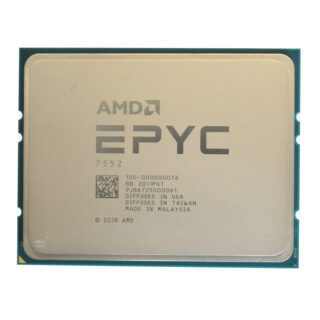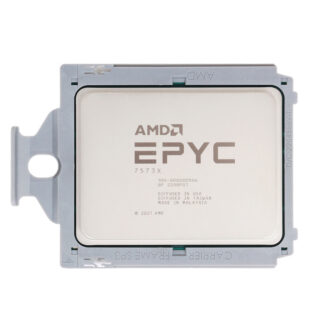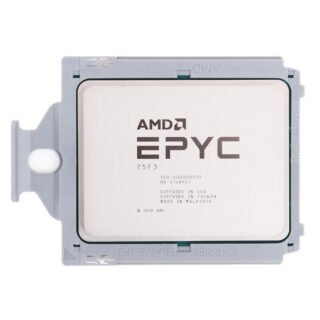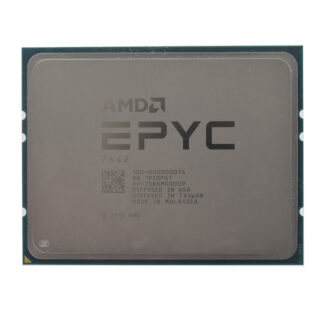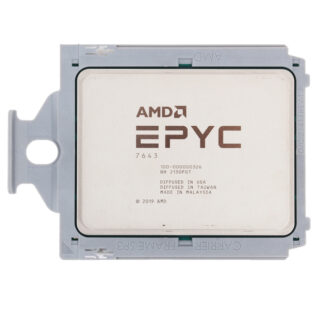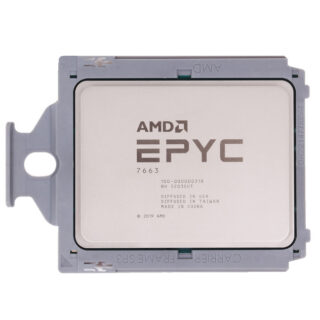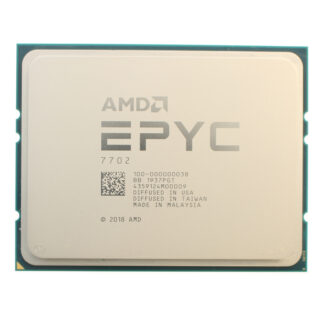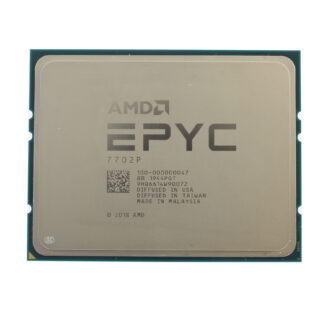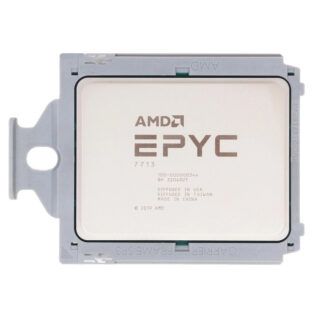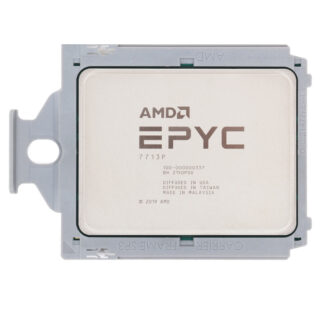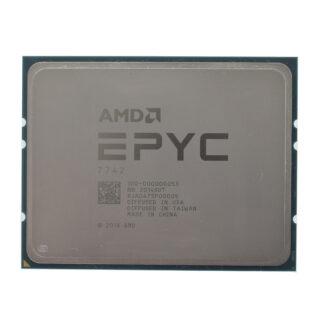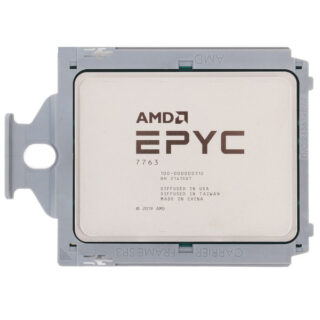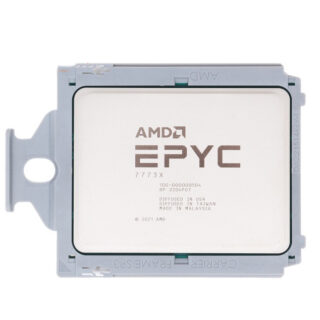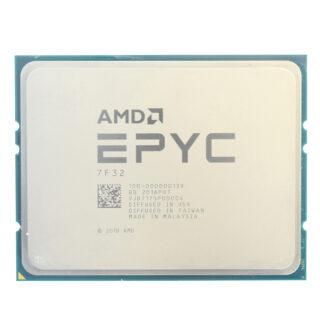Categories
TOP RATED PRODUCTS
-
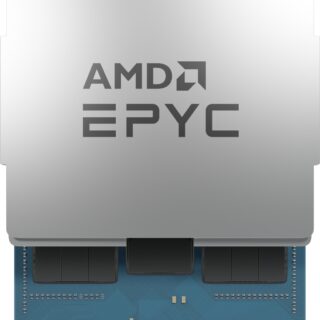 AMD EPYC 7663P
$3,139.00
AMD EPYC 7663P
$3,139.00
-
 AMD EPYC 7643P
$2,722.00
AMD EPYC 7643P
$2,722.00
-
 AMD EPYC 7303P
$594.00
AMD EPYC 7303P
$594.00
-
 AMD EPYC 7303
$604.00
AMD EPYC 7303
$604.00
-
 AMD EPYC 7203P
$348.00
AMD EPYC 7203P
$348.00
CLIENT'S TESTOMONIAL

JACK
Vivamus sit amet egestas metus. Interdum et malesuada fames ac ante ipsum primis in faucibus. Interdum et malesuada fames ac ante ipsum primis in faucibus.

ROBIN
Vivamus sit amet egestas metus. Interdum et malesuada fames ac ante ipsum primis in faucibus. Interdum et malesuada fames ac ante ipsum primis in faucibus.
Category: CPU/Processor
CPU/Processor
Showing 33–48 of 127 results
-
AMD Server CPU
AMD EPYC 7552
$3,400.00Add to cartThe AMD EPYC 7552 is a server/workstation processor with 48 cores, launched in August 2019. It is part of the EPYC lineup, using the Zen 2 (Rome) architecture with Socket SP3. Thanks to AMD Simultaneous Multithreading (SMT) the core-count is effectively doubled, to 96 threads. To further increase overall system performance, up to two EPYC 7552 CPUs can work together in a multi-processor (SMP) configuration. EPYC 7552 has 192 MB of L3 cache and operates at 2.2 GHz by default, but can boost up to 3.35 GHz, depending on the workload. AMD is making the EPYC 7552 on a 7 nm production node using 3,800 million transistors. The silicon die of the chip is not fabricated at AMD, but at the foundry of TSMC. The multiplier is locked on EPYC 7552, which limits its overclocking potential.
With a TDP of 200 W, the EPYC 7552 is extremely power hungry, which means you need top-notch cooling. AMD’s processor supports DDR4 memory with an eight-channel interface. The highest officially supported memory speed is 3200 MT/s, but with overclocking (and the right memory modules) you can go even higher. ECC memory is supported, too, which is an important capability for mission-critical systems, to avoid data corruption. For communication with other components in the system, EPYC 7552 uses a PCI-Express Gen 4 connection. This processor lacks integrated graphics, you might need a graphics card.
Hardware virtualization is available on the EPYC 7552, which greatly improves virtual machine performance. Additionally, IOMMU virtualization (PCI passthrough) is supported, so that guest virtual machines may directly use host hardware. Programs using Advanced Vector Extensions (AVX) can run on this processor, boosting performance for calculation-heavy applications. Besides AVX, AMD is including the newer AVX2 standard, too, but not AVX-512. -
AMD Server CPU
AMD EPYC 7573X
$5,590.00Add to cartThe AMD EPYC 7573X is a server/workstation processor with 32 cores, launched in March 2022, at an MSRP of $5590. It is part of the EPYC lineup, using the Zen 3 (Milan) architecture with Socket SP3. Thanks to AMD Simultaneous Multithreading (SMT) the core-count is effectively doubled, to 64 threads. EPYC 7573X has 768 MB of L3 cache and operates at 2.8 GHz by default, but can boost up to 3.6 GHz, depending on the workload. AMD is making the EPYC 7573X on a 7 nm production node using 33,200 million transistors. The silicon die of the chip is not fabricated at AMD, but at the foundry of TSMC. The multiplier is locked on EPYC 7573X, which limits its overclocking potential.
With a TDP of 280 W, the EPYC 7573X is extremely power hungry, which means you need top-notch cooling. AMD’s processor supports DDR4 memory with an eight-channel interface. The highest officially supported memory speed is 3200 MT/s, but with overclocking (and the right memory modules) you can go even higher. ECC memory is supported, too, which is an important capability for mission-critical systems, to avoid data corruption. For communication with other components in the computer, EPYC 7573X uses a PCI-Express Gen 4 connection. This processor lacks integrated graphics, you might need a graphics card.
Hardware virtualization is available on the EPYC 7573X, which greatly improves virtual machine performance. Additionally, IOMMU virtualization (PCI passthrough) is supported, so that guest virtual machines may directly use host hardware. Programs using Advanced Vector Extensions (AVX) can run on this processor, boosting performance for calculation-heavy applications. Besides AVX, AMD is including the newer AVX2 standard, too, but not AVX-512. -
AMD Server CPU
AMD EPYC 75F3
$4,860.00Add to cartThe AMD EPYC 75F3 is a server/workstation processor with 32 cores, launched in March 2021, at an MSRP of $4860. It is part of the EPYC lineup, using the Zen 3 (Milan) architecture with Socket SP3. Thanks to AMD Simultaneous Multithreading (SMT) the core-count is effectively doubled, to 64 threads. To further increase overall system performance, up to two EPYC 75F3 CPUs can work together in a multi-processor (SMP) configuration. EPYC 75F3 has 256 MB of L3 cache and operates at 2.95 GHz by default, but can boost up to 4 GHz, depending on the workload. AMD is making the EPYC 75F3 on a 7 nm production node using 33,200 million transistors. The silicon die of the chip is not fabricated at AMD, but at the foundry of TSMC. The multiplier is locked on EPYC 75F3, which limits its overclocking potential.
With a TDP of 280 W, the EPYC 75F3 is extremely power hungry, which means you need top-notch cooling. AMD’s processor supports DDR4 memory with an eight-channel interface. The highest officially supported memory speed is 3200 MT/s, but with overclocking (and the right memory modules) you can go even higher. ECC memory is supported, too, which is an important capability for mission-critical systems, to avoid data corruption. For communication with other components in the machine, EPYC 75F3 uses a PCI-Express Gen 4 connection. This processor lacks integrated graphics, you might need a graphics card.
Hardware virtualization is available on the EPYC 75F3, which greatly improves virtual machine performance. Additionally, IOMMU virtualization (PCI passthrough) is supported, so that guest virtual machines may directly use host hardware. Programs using Advanced Vector Extensions (AVX) can run on this processor, boosting performance for calculation-heavy applications. Besides AVX, AMD is including the newer AVX2 standard, too, but not AVX-512. -
AMD Server CPU
AMD EPYC 7642
$2,810.00Add to cartThe AMD EPYC 7642 is a server/workstation processor with 48 cores, launched in August 2019. It is part of the EPYC lineup, using the Zen 2 (Rome) architecture with Socket SP3. Thanks to AMD Simultaneous Multithreading (SMT) the core-count is effectively doubled, to 96 threads. To further increase overall system performance, up to two EPYC 7642 CPUs can link up in a multi-processor (SMP) configuration. EPYC 7642 has 256 MB of L3 cache and operates at 2.4 GHz by default, but can boost up to 3.4 GHz, depending on the workload. AMD is building the EPYC 7642 on a 7 nm production process using 3,800 million transistors. The silicon die of the chip is not fabricated at AMD, but at the foundry of TSMC. The multiplier is locked on EPYC 7642, which limits its overclocking capabilities.
With a TDP of 225 W, the EPYC 7642 is extremely power hungry, which means you need top-notch cooling. AMD’s processor supports DDR4 memory with an eight-channel interface. The highest officially supported memory speed is 3200 MT/s, but with overclocking (and the right memory modules) you can go even higher. ECC memory is supported, too, which is an important capability for mission-critical systems, to avoid data corruption. For communication with other components in the computer, EPYC 7642 uses a PCI-Express Gen 4 connection. This processor lacks integrated graphics, you might need a graphics card.
Hardware virtualization is available on the EPYC 7642, which greatly improves virtual machine performance. Additionally, IOMMU virtualization (PCI passthrough) is supported, so that guest virtual machines may directly use host hardware. Programs using Advanced Vector Extensions (AVX) will run on this processor, boosting performance for calculation-heavy applications. Besides AVX, AMD is including the newer AVX2 standard, too, but not AVX-512. -
AMD Server CPU
AMD EPYC 7643
$4,995.00Add to cartThe AMD EPYC 7643 is a server/workstation processor with 48 cores, launched in March 2021, at an MSRP of $4995. It is part of the EPYC lineup, using the Zen 3 (Milan) architecture with Socket SP3. Thanks to AMD Simultaneous Multithreading (SMT) the core-count is effectively doubled, to 96 threads. To further increase overall system performance, up to two EPYC 7643 CPUs can link up in a multi-processor (SMP) configuration. EPYC 7643 has 256 MB of L3 cache and operates at 2.3 GHz by default, but can boost up to 3.6 GHz, depending on the workload. AMD is building the EPYC 7643 on a 7 nm production process using 33,200 million transistors. The silicon die of the chip is not fabricated at AMD, but at the foundry of TSMC. The multiplier is locked on EPYC 7643, which limits its overclocking capabilities.
With a TDP of 225 W, the EPYC 7643 is extremely power hungry, which means you need top-notch cooling. AMD’s processor supports DDR4 memory with an eight-channel interface. The highest officially supported memory speed is 3200 MT/s, but with overclocking (and the right memory modules) you can go even higher. ECC memory is supported, too, which is an important capability for mission-critical systems, to avoid data corruption. For communication with other components in the system, EPYC 7643 uses a PCI-Express Gen 4 connection. This processor lacks integrated graphics, you might need a graphics card.
Hardware virtualization is available on the EPYC 7643, which greatly improves virtual machine performance. Additionally, IOMMU virtualization (PCI passthrough) is supported, so that guest virtual machines may directly use host hardware. Programs using Advanced Vector Extensions (AVX) will run on this processor, boosting performance for calculation-heavy applications. Besides AVX, AMD is including the newer AVX2 standard, too, but not AVX-512. -
AMD Server CPU
AMD EPYC 7643P
$2,722.00Add to cartThe AMD EPYC 7643P is a server/workstation processor with 48 cores, launched in September 2023, at an MSRP of $2722. It is part of the EPYC lineup, using the Zen 3 (Milan) architecture with Socket SP3. Thanks to AMD Simultaneous Multithreading (SMT) the core-count is effectively doubled, to 96 threads. EPYC 7643P has 256 MB of L3 cache and operates at 2.3 GHz by default, but can boost up to 3.6 GHz, depending on the workload. AMD is building the EPYC 7643P on a 7 nm production process using 33,200 million transistors. The silicon die of the chip is not fabricated at AMD, but at the foundry of TSMC. The multiplier is locked on EPYC 7643P, which limits its overclocking capabilities.
With a TDP of 225 W, the EPYC 7643P is extremely power hungry, which means you need top-notch cooling. AMD’s processor supports DDR4 memory with an eight-channel interface. The highest officially supported memory speed is 3200 MT/s, but with overclocking (and the right memory modules) you can go even higher. ECC memory is supported, too, which is an important capability for mission-critical systems, to avoid data corruption. For communication with other components in the computer, EPYC 7643P uses a PCI-Express Gen 4 connection. This processor lacks integrated graphics, you might need a graphics card.
Hardware virtualization is available on the EPYC 7643P, which greatly improves virtual machine performance. Additionally, IOMMU virtualization (PCI passthrough) is supported, so that guest virtual machines may directly use host hardware. Programs using Advanced Vector Extensions (AVX) will run on this processor, boosting performance for calculation-heavy applications. Besides AVX, AMD is including the newer AVX2 standard, too, but not AVX-512. -
AMD Server CPU
AMD EPYC 7663
$6,366.00Add to cartThe AMD EPYC 7663 is a server/workstation processor with 56 cores, launched in March 2021, at an MSRP of $6366. It is part of the EPYC lineup, using the Zen 3 (Milan) architecture with Socket SP3. Thanks to AMD Simultaneous Multithreading (SMT) the core-count is effectively doubled, to 112 threads. To further increase overall system performance, up to two EPYC 7663 CPUs can work together in a multi-processor (SMP) configuration. EPYC 7663 has 256 MB of L3 cache and operates at 2000 MHz by default, but can boost up to 3.5 GHz, depending on the workload. AMD is making the EPYC 7663 on a 7 nm production node using 33,200 million transistors. The silicon die of the chip is not fabricated at AMD, but at the foundry of TSMC. The multiplier is locked on EPYC 7663, which limits its overclocking potential.
With a TDP of 240 W, the EPYC 7663 is extremely power hungry, which means you need top-notch cooling. AMD’s processor supports DDR4 memory with an eight-channel interface. The highest officially supported memory speed is 3200 MT/s, but with overclocking (and the right memory modules) you can go even higher. ECC memory is supported, too, which is an important capability for mission-critical systems, to avoid data corruption. For communication with other components in the computer, EPYC 7663 uses a PCI-Express Gen 4 connection. This processor lacks integrated graphics, you might need a graphics card.
Hardware virtualization is available on the EPYC 7663, which greatly improves virtual machine performance. Additionally, IOMMU virtualization (PCI passthrough) is supported, so that guest virtual machines may directly use host hardware. Programs using Advanced Vector Extensions (AVX) can run on this processor, boosting performance for calculation-heavy applications. Besides AVX, AMD is including the newer AVX2 standard, too, but not AVX-512. -
AMD Server CPU
AMD EPYC 7663P
$3,139.00Add to cartThe AMD EPYC 7663P is a server/workstation processor with 56 cores, launched in September 2023, at an MSRP of $3139. It is part of the EPYC lineup, using the Zen 3 (Milan) architecture with Socket SP3. Thanks to AMD Simultaneous Multithreading (SMT) the core-count is effectively doubled, to 112 threads. EPYC 7663P has 256 MB of L3 cache and operates at 2000 MHz by default, but can boost up to 3.5 GHz, depending on the workload. AMD is making the EPYC 7663P on a 7 nm production node using 33,200 million transistors. The silicon die of the chip is not fabricated at AMD, but at the foundry of TSMC. The multiplier is locked on EPYC 7663P, which limits its overclocking potential.
With a TDP of 240 W, the EPYC 7663P is extremely power hungry, which means you need top-notch cooling. AMD’s processor supports DDR4 memory with an eight-channel interface. The highest officially supported memory speed is 3200 MT/s, but with overclocking (and the right memory modules) you can go even higher. ECC memory is supported, too, which is an important capability for mission-critical systems, to avoid data corruption. For communication with other components in the machine, EPYC 7663P uses a PCI-Express Gen 4 connection. This processor lacks integrated graphics, you might need a graphics card.
Hardware virtualization is available on the EPYC 7663P, which greatly improves virtual machine performance. Additionally, IOMMU virtualization (PCI passthrough) is supported, so that guest virtual machines may directly use host hardware. Programs using Advanced Vector Extensions (AVX) can run on this processor, boosting performance for calculation-heavy applications. Besides AVX, AMD is including the newer AVX2 standard, too, but not AVX-512. -
AMD Server CPU
AMD EPYC 7702
$2,890.00Add to cartThe AMD EPYC 7702 is a server/workstation processor with 64 cores, launched in August 2019. It is part of the EPYC lineup, using the Zen 2 (Rome) architecture with Socket SP3. Thanks to AMD Simultaneous Multithreading (SMT) the core-count is effectively doubled, to 128 threads. To further increase overall system performance, up to two EPYC 7702 CPUs can work together in a multi-processor (SMP) configuration. EPYC 7702 has 256 MB of L3 cache and operates at 2000 MHz by default, but can boost up to 3.35 GHz, depending on the workload. AMD is making the EPYC 7702 on a 7 nm production node using 3,800 million transistors. The silicon die of the chip is not fabricated at AMD, but at the foundry of TSMC. The multiplier is locked on EPYC 7702, which limits its overclocking potential.
With a TDP of 200 W, the EPYC 7702 is extremely power hungry, which means you need top-notch cooling. AMD’s processor supports DDR4 memory with an eight-channel interface. The highest officially supported memory speed is 3200 MT/s, but with overclocking (and the right memory modules) you can go even higher. ECC memory is supported, too, which is an important capability for mission-critical systems, to avoid data corruption. For communication with other components in the machine, EPYC 7702 uses a PCI-Express Gen 4 connection. This processor lacks integrated graphics, you might need a graphics card.
Hardware virtualization is available on the EPYC 7702, which greatly improves virtual machine performance. Additionally, IOMMU virtualization (PCI passthrough) is supported, so that guest virtual machines may directly use host hardware. Programs using Advanced Vector Extensions (AVX) can run on this processor, boosting performance for calculation-heavy applications. Besides AVX, AMD is including the newer AVX2 standard, too, but not AVX-512. -
AMD Server CPU
AMD EPYC 7702P
$1,400.00Add to cartThe AMD EPYC 7702P is a server/workstation processor with 64 cores, launched in August 2019. It is part of the EPYC lineup, using the Zen 2 (Rome) architecture with Socket SP3. Thanks to AMD Simultaneous Multithreading (SMT) the core-count is effectively doubled, to 128 threads. EPYC 7702P has 256 MB of L3 cache and operates at 2000 MHz by default, but can boost up to 3.35 GHz, depending on the workload. AMD is building the EPYC 7702P on a 7 nm production process using 3,800 million transistors. The silicon die of the chip is not fabricated at AMD, but at the foundry of TSMC. The multiplier is locked on EPYC 7702P, which limits its overclocking capabilities.
With a TDP of 200 W, the EPYC 7702P is extremely power hungry, which means you need top-notch cooling. AMD’s processor supports DDR4 memory with an eight-channel interface. The highest officially supported memory speed is 3200 MT/s, but with overclocking (and the right memory modules) you can go even higher. ECC memory is supported, too, which is an important capability for mission-critical systems, to avoid data corruption. For communication with other components in the computer, EPYC 7702P uses a PCI-Express Gen 4 connection. This processor lacks integrated graphics, you might need a graphics card.
Hardware virtualization is available on the EPYC 7702P, which greatly improves virtual machine performance. Additionally, IOMMU virtualization (PCI passthrough) is supported, so that guest virtual machines may directly use host hardware. Programs using Advanced Vector Extensions (AVX) will run on this processor, boosting performance for calculation-heavy applications. Besides AVX, AMD is including the newer AVX2 standard, too, but not AVX-512. -
AMD Server CPU
AMD EPYC 7713
$7,060.00Add to cartThe AMD EPYC 7713 is a server/workstation processor with 64 cores, launched in March 2021, at an MSRP of $7060. It is part of the EPYC lineup, using the Zen 3 (Milan) architecture with Socket SP3. Thanks to AMD Simultaneous Multithreading (SMT) the core-count is effectively doubled, to 128 threads. To further increase overall system performance, up to two EPYC 7713 CPUs can work together in a multi-processor (SMP) configuration. EPYC 7713 has 256 MB of L3 cache and operates at 2000 MHz by default, but can boost up to 3.675 GHz, depending on the workload. AMD is making the EPYC 7713 on a 7 nm production node using 33,200 million transistors. The silicon die of the chip is not fabricated at AMD, but at the foundry of TSMC. The multiplier is locked on EPYC 7713, which limits its overclocking potential.
With a TDP of 225 W, the EPYC 7713 is extremely power hungry, which means you need top-notch cooling. AMD’s processor supports DDR4 memory with an eight-channel interface. The highest officially supported memory speed is 3200 MT/s, but with overclocking (and the right memory modules) you can go even higher. ECC memory is supported, too, which is an important capability for mission-critical systems, to avoid data corruption. For communication with other components in the system, EPYC 7713 uses a PCI-Express Gen 4 connection. This processor lacks integrated graphics, you might need a graphics card.
Hardware virtualization is available on the EPYC 7713, which greatly improves virtual machine performance. Additionally, IOMMU virtualization (PCI passthrough) is supported, so that guest virtual machines may directly use host hardware. Programs using Advanced Vector Extensions (AVX) can run on this processor, boosting performance for calculation-heavy applications. Besides AVX, AMD is including the newer AVX2 standard, too, but not AVX-512. -
AMD Server CPU
AMD EPYC 7713P
$5,010.00Add to cartThe AMD EPYC 7713P is a server/workstation processor with 64 cores, launched in March 2021, at an MSRP of $5010. It is part of the EPYC lineup, using the Zen 3 (Milan) architecture with Socket SP3. Thanks to AMD Simultaneous Multithreading (SMT) the core-count is effectively doubled, to 128 threads. EPYC 7713P has 256 MB of L3 cache and operates at 2000 MHz by default, but can boost up to 3.675 GHz, depending on the workload. AMD is building the EPYC 7713P on a 7 nm production process using 33,200 million transistors. The silicon die of the chip is not fabricated at AMD, but at the foundry of TSMC. The multiplier is locked on EPYC 7713P, which limits its overclocking capabilities.
With a TDP of 225 W, the EPYC 7713P is extremely power hungry, which means you need top-notch cooling. AMD’s processor supports DDR4 memory with an eight-channel interface. The highest officially supported memory speed is 3200 MT/s, but with overclocking (and the right memory modules) you can go even higher. ECC memory is supported, too, which is an important capability for mission-critical systems, to avoid data corruption. For communication with other components in the machine, EPYC 7713P uses a PCI-Express Gen 4 connection. This processor lacks integrated graphics, you might need a graphics card.
Hardware virtualization is available on the EPYC 7713P, which greatly improves virtual machine performance. Additionally, IOMMU virtualization (PCI passthrough) is supported, so that guest virtual machines may directly use host hardware. Programs using Advanced Vector Extensions (AVX) will run on this processor, boosting performance for calculation-heavy applications. Besides AVX, AMD is including the newer AVX2 standard, too, but not AVX-512. -
AMD Server CPU
AMD EPYC 7742
$2,810.00Add to cartThe AMD EPYC 7742 is a server/workstation processor with 64 cores, launched in August 2019. It is part of the EPYC lineup, using the Zen 2 (Rome) architecture with Socket SP3. Thanks to AMD Simultaneous Multithreading (SMT) the core-count is effectively doubled, to 128 threads. To further increase overall system performance, up to two EPYC 7742 CPUs can link up in a multi-processor (SMP) configuration. EPYC 7742 has 256 MB of L3 cache and operates at 2.25 GHz by default, but can boost up to 3.4 GHz, depending on the workload. AMD is building the EPYC 7742 on a 7 nm production process using 3,800 million transistors. The silicon die of the chip is not fabricated at AMD, but at the foundry of TSMC. The multiplier is locked on EPYC 7742, which limits its overclocking capabilities.
With a TDP of 225 W, the EPYC 7742 is extremely power hungry, which means you need top-notch cooling. AMD’s processor supports DDR4 memory with an eight-channel interface. The highest officially supported memory speed is 3200 MT/s, but with overclocking (and the right memory modules) you can go even higher. ECC memory is supported, too, which is an important capability for mission-critical systems, to avoid data corruption. For communication with other components in the system, EPYC 7742 uses a PCI-Express Gen 4 connection. This processor lacks integrated graphics, you might need a graphics card.
Hardware virtualization is available on the EPYC 7742, which greatly improves virtual machine performance. Additionally, IOMMU virtualization (PCI passthrough) is supported, so that guest virtual machines may directly use host hardware. Programs using Advanced Vector Extensions (AVX) will run on this processor, boosting performance for calculation-heavy applications. Besides AVX, AMD is including the newer AVX2 standard, too, but not AVX-512. -
AMD Server CPU
AMD EPYC 7763
$7,890.00Add to cartThe AMD EPYC 7763 is a server/workstation processor with 64 cores, launched in March 2021, at an MSRP of $7890. It is part of the EPYC lineup, using the Zen 3 (Milan) architecture with Socket SP3. Thanks to AMD Simultaneous Multithreading (SMT) the core-count is effectively doubled, to 128 threads. To further increase overall system performance, up to two EPYC 7763 CPUs can link up in a multi-processor (SMP) configuration. EPYC 7763 has 256 MB of L3 cache and operates at 2.45 GHz by default, but can boost up to 3.5 GHz, depending on the workload. AMD is building the EPYC 7763 on a 7 nm production process using 33,200 million transistors. The silicon die of the chip is not fabricated at AMD, but at the foundry of TSMC. The multiplier is locked on EPYC 7763, which limits its overclocking capabilities.
With a TDP of 280 W, the EPYC 7763 is extremely power hungry, which means you need top-notch cooling. AMD’s processor supports DDR4 memory with an eight-channel interface. The highest officially supported memory speed is 3200 MT/s, but with overclocking (and the right memory modules) you can go even higher. ECC memory is supported, too, which is an important capability for mission-critical systems, to avoid data corruption. For communication with other components in the computer, EPYC 7763 uses a PCI-Express Gen 4 connection. This processor lacks integrated graphics, you might need a graphics card.
Hardware virtualization is available on the EPYC 7763, which greatly improves virtual machine performance. Additionally, IOMMU virtualization (PCI passthrough) is supported, so that guest virtual machines may directly use host hardware. Programs using Advanced Vector Extensions (AVX) will run on this processor, boosting performance for calculation-heavy applications. Besides AVX, AMD is including the newer AVX2 standard, too, but not AVX-512. -
AMD Server CPU
AMD EPYC 7773X
$8,800.00Add to cartThe AMD EPYC 7773X is a server/workstation processor with 64 cores, launched in March 2022, at an MSRP of $8800. It is part of the EPYC lineup, using the Zen 3 (Milan) architecture with Socket SP3. Thanks to AMD Simultaneous Multithreading (SMT) the core-count is effectively doubled, to 128 threads. To further increase overall system performance, up to two EPYC 7773X CPUs can link up in a multi-processor (SMP) configuration. EPYC 7773X has 768 MB of L3 cache and operates at 2.2 GHz by default, but can boost up to 3.5 GHz, depending on the workload. AMD is building the EPYC 7773X on a 7 nm production process using 33,200 million transistors. The silicon die of the chip is not fabricated at AMD, but at the foundry of TSMC. The multiplier is locked on EPYC 7773X, which limits its overclocking capabilities.
With a TDP of 280 W, the EPYC 7773X is extremely power hungry, which means you need top-notch cooling. AMD’s processor supports DDR4 memory with an eight-channel interface. The highest officially supported memory speed is 3200 MT/s, but with overclocking (and the right memory modules) you can go even higher. ECC memory is supported, too, which is an important capability for mission-critical systems, to avoid data corruption. For communication with other components in the machine, EPYC 7773X uses a PCI-Express Gen 4 connection. This processor lacks integrated graphics, you might need a graphics card.
Hardware virtualization is available on the EPYC 7773X, which greatly improves virtual machine performance. Additionally, IOMMU virtualization (PCI passthrough) is supported, so that guest virtual machines may directly use host hardware. Programs using Advanced Vector Extensions (AVX) will run on this processor, boosting performance for calculation-heavy applications. Besides AVX, AMD is including the newer AVX2 standard, too, but not AVX-512. -
AMD Server CPU
AMD EPYC 7F32
$2,019.00Add to cartThe AMD EPYC 7F32 is a server/workstation processor with 8 cores, launched in April 2020. It is part of the EPYC lineup, using the Zen 2 (Rome) architecture with Socket SP3. Thanks to AMD Simultaneous Multithreading (SMT) the core-count is effectively doubled, to 16 threads. EPYC 7F32 has 128 MB of L3 cache and operates at 3.7 GHz by default, but can boost up to 3.9 GHz, depending on the workload. AMD is making the EPYC 7F32 on a 7 nm production node using 3,800 million transistors. The silicon die of the chip is not fabricated at AMD, but at the foundry of TSMC. The multiplier is locked on EPYC 7F32, which limits its overclocking potential.
With a TDP of 180 W, the EPYC 7F32 is extremely power hungry, which means you need top-notch cooling. AMD’s processor supports DDR4 memory with an eight-channel interface. The highest officially supported memory speed is 3200 MT/s, but with overclocking (and the right memory modules) you can go even higher. ECC memory is supported, too, which is an important capability for mission-critical systems, to avoid data corruption. For communication with other components in the machine, EPYC 7F32 uses a PCI-Express Gen 4 connection. This processor lacks integrated graphics, you might need a graphics card.
Hardware virtualization is available on the EPYC 7F32, which greatly improves virtual machine performance. Additionally, IOMMU virtualization (PCI passthrough) is supported, so that guest virtual machines may directly use host hardware. Programs using Advanced Vector Extensions (AVX) can run on this processor, boosting performance for calculation-heavy applications. Besides AVX, AMD is including the newer AVX2 standard, too, but not AVX-512.
ABOUT ME
FEATURED PRODUCTS
AD WIDGET

FROM THE BLOG
vel mollis massa urna sollicitudin mi. Nullam nulla nisi, accumsan eu finibus eu, vestibulum eget dui. Lorem ipsum dolor sit amet, consectetur adipiscing elit. Aenean feugiat dolor ligula, ac dictum libero sodales at. Pellentesque vulputate eros eu mattis aliquet. Curabitur euismod neque sit amet mauris condimentum, nec faucibus ex ultricies. Aenean finibus lacus vel tortor
Dharetra lorem, sed pulvinar purus. Nam eleifend euismod faucibus. Sed pharetra cursus convallis. Cras mollis nulla tristique risus gravida, in posuere ligula pretium. Nulla congue ex vitae erat egestas tincidunt. Mauris a orci quis urna feugiat sollicitudin. Maecenas finibus cursus neque, a molestie leo viverra sed. Curabitur id odio sed tellus fringilla tristique. Etiam egestas
Vivamus non fermentum nunc. Nulla hendrerit vestibulum condimentum. Vestibulum ante ipsum primis in faucibus orci luctus et ultrices posuere cubilia curae; Cras eget lacinia nulla. Donec vitae auctor quam. Donec nibh lacus, scelerisque sit amet semper sit amet, consequat in nisi. Maecenas blandit porttitor diam, ut dignissim massa iaculis tincidunt. Maecenas sapien erat, gravida id

